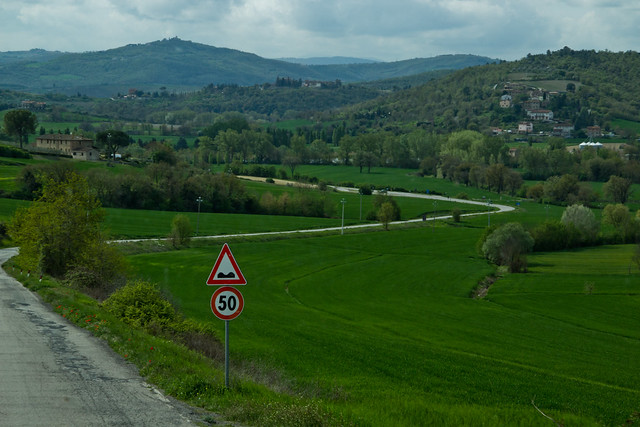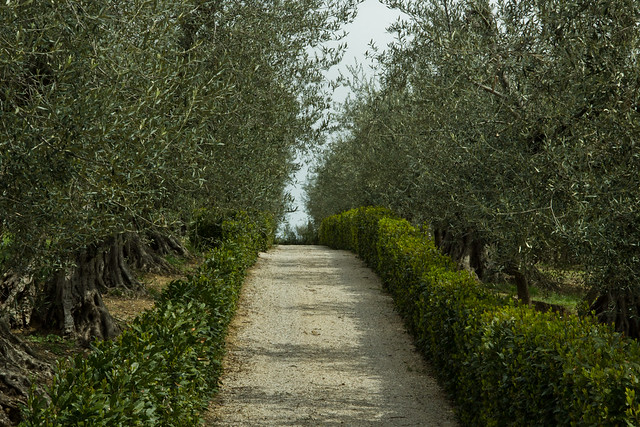A trip to Umbria is incomplete without at least a few hours spent wandering the region’s maze of wonderful country roads. While the Romans may be well remembered for giving us the sterile albeit easy to navigate Roman grid, incredible aqueducts and grand highways it is no doubt that it was Italy’s winding network of country roads that spawned the oft repeated phrase, “all roads lead to Rome”. Though the mixed clouds that had plagued my visit to Umbria continued to threaten light rain, they gave way fairly quickly to a (mostly) sunny day. Eager to soak up the sun and to see more of the Italian countryside several fellow travel bloggers and I hopped on board a coach and eagerly prepared for a two and a half day tour put on by the region and a number of local businesses. They had extended an invitation to wine us, dine us, enlighten us, and to showcase and share a brief taste of their region. A region they were incredibly proud of. A region so jam packed with rich experiences to see and and live that even with the two and a half jam-packed days we had, I feel as though we only just left a smudge on the surface of what’s out there to see.
Our first stop was the Monte Vibiano Winery located in Mercatello, Italy. Our tour started with a brief introduction just outside the vineyard’s main building and tasting center, before we hopped into several hulking electronic golf carts and set out towards the vineyards. Though only an 8 minute “drive” away, our path took us up through the small town’s winding streets and along an old country lane where we paused briefly to chat with several local townspeople who were out taking advantage of the sunny weather.
With knee high boots and snake sticks in hand they were slowly working their way along the hill’s steep incline searching for the fresh asparagus which grows in the grasses around the roots of the ancient olive trees. The sight brought back memories of my early childhood. Though we moved to Arizona when I was six, I have vague memories of walking the ditches with my Dad near our home in Cortez, Colorado. The house sat at the end of a long dirt driveway near the end of an old gravel county road. We were off the grid and had to haul our own water. It was worth it though as the trade-off was 10 acres sandwiched in the midst of another several hundred of wild southwestern land mixed in with a patch-work of fields. In spring, when things were growing and the snow melt fed the local vegetation, it was often possible to find wild asparagus. We’d pick it and while some made it home for dinner – I remember happily nibbling away on most of it there, on the spot. Though I didn’t get to try any of the Italian asparagus that moment, it wouldn’t be long before I had the opportunity to sample it as part of some of the local cuisine.
One thing that caught me by surprise was their caution, and mention of vipers. Though they’ve played a somewhat prominent role in Italian history I have to admit that their concern and mention of the small snakes took me by surprise. That surprise didn’t last long, however, and quickly gave way to fanciful thoughts of Cleopatra, grand stories of love, adventure, empire, and history.
I was pulled out of my musings by a call to re-board the carts. We hopped in, strapped in, and then resumed our climb up the hill before turning down a shrub lined gravel path which cut across the olive orchard towards an old vineyard. Our host explained that some of the olive trees were hundreds of years old and a quick glance at their gnarled roots quickly confirmed it. It’s amazing to think what those trees have survived. Harsh winters, changing climates, world wars, recessions, the invention of the automobile, the airplane, the space race…and all the while they’ve sat there slowly churning the soil, soaking up the Italian sun, and gorging themselves on the region’s clean water.
As we rolled to a gentle stop I hopped out of the back of the cart and quickly did a 360, nearly tripping over my own feet in the process. As we paused, circled around our host in the shade of a large tree, we found ourselves on top of an old retaining wall. On one side there was the olive orchard. On the other a relatively young vineyard awash in color and surrounded by old, crumbling stone walls that bespoke great age, but also constant care and repair.
As it turned out we were standing on an ancient road which dated back nearly 2,000 years and had been used to transport goods overland to the sea. The orchard we were looking at, and quickly set to exploring, had recently been replanted, some 4 years previous, but had been in operation off and on by different groups for several thousand years as well. The rock walls, though often repaired, were of a similar heritage. We spent a good 20 minutes relaxing and enjoying. It was gorgeous. The view out over the vines offered a great panorama of rolling hills and blooming flowers. The paths between the vines were covered in the vibrant yellow of blooming flowers periodically broken by the white blooms of wildflowers. Back near the stone walls red poppies and other vibrantly colored wild flowers were also in bloom. Everything felt fresh. Alive. Delightful!
Then, as is the way with these types of things it was time to return. We wound back down the gravel lane, past the asparagus pickers, past lazy cats lounging in the doorways of the small town, and then parked next to the vineyard’s main building. Before long we were standing surrounded by walls of large stainless steel vats full of wine in a temperature controlled room and learning about the region’s specialty – the Sangiovese grape, as well as Monte Vibianos wine making process.
From there it was on to the good stuff….down a winding hallway, set of stairs, and through a magical set of doors to the wine cellar where the wine was eventually taken to age.
For me, it was a first. While I’ve spent time around old bottles and like to think that I’ve waged a fairly successful lifetime war against full bottles of wine, it was my first time down in the cellar with the casks, which was a fun experience. The air was slightly cooler than I expected and even though it was spotless, the room carried the light scent of young casks accented by the soft twang of young wine. We paused again briefly as our guide explained the process, some of the grapes used, how long the wine ages, how many times they re-use a cask, and other interesting insights into the wine making process, before heading up to the tasting room to sample each the vineyard’s wine selection.
The tasting room was beautiful with a wonderful bar back made out of stained wood with inlaid recesses showcasing the vineyard’s wine. After a quick walk through to visually soak in our surroundings we settled in to comfortable chairs and relaxed. Before long our hosts served us fresh bred accompanied by their own line of delicious olive oil. The oil was great, the bread was good, and it was the perfect mid-morning snack to ease us into wine sampling. A few moments later we were introduced to the first wine, which was also their youngest. As we slowly worked through samples of each of their other offerings, working our way up to their premier/flagship wine I enjoyed each sample thoroughly. I found of the five I had a slight personal preference towards their rich reds, which aligns with my general preferences. The chance to taste the wine where it had been made, to walk the vines, and to connect with the history of the area made for a rich experience and one which was extremely enjoyable.
Eventually it was time to tear ourselves away from the olive oil, bread and our emptied glasses of wine. We said our goodbyes and prepared to resume our trip across Umbria’s rich countryside. It was only a bit past 11:30AM…the day had just begun.


